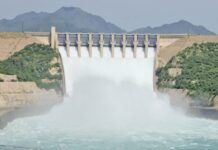
SYDNEY, May 27 (Xinhua/APP): Researchers from Australia’s Curtin University have analyzed seawater samples from across the globe and discovered that even the most remote areas of the vast ocean contain traces of microplastics.
The report, titled “Around the plastic world in 455 days” and published on Friday, collected 177 seawater samples across a 46,100 km, 177-day voyage from Australia’s west coast around South America and back to Australia’s east coast.
Lead researcher and John Curtin Distinguished Professor, Kliti Grice, said the extensive samples provided the first accurate measure of the presence of microplastics in unique ocean environments.
“The aim of the study was to target areas of the world’s oceans not previously sampled for microplastics and to produce a complete global snapshot of microplastics distribution,” said Grice.
The samples included microplastics from vehicle tyres, pellet spills, textiles, building debris, cosmetics, and packaging materials, and were found in almost every area of the ocean.
“The vast majority of the seawater filters used by Jon [who conducted the voyage] were found to contain microplastics, however some areas of the ocean, particularly the Pacific, had several consecutive sampling locations, not near any major islands where no microplastics were observed,” added Grice.
Microplastics are the result of plastic waste being discarded and then degrading into smaller and smaller pieces.
A 2020 study from Australia’s CSIRO’s Oceans and Atmosphere unit estimated that there are 22.8 million tons of microplastics in the world’s oceans, the majority of which rest on the ocean floor.
Microplastics affect a variety of aspects of marine life. They are toxic to fish when ingested, and end up in concentrated amounts in the food and water.
The researchers hoped the findings would raise awareness by showing the presence of microplastics in places never before tested.
The fieldwork itself relied on the undertaking of voyages by citizen scientists, and several yacht owners have expressed interest in future expeditions in other lesser-studied areas of the ocean.